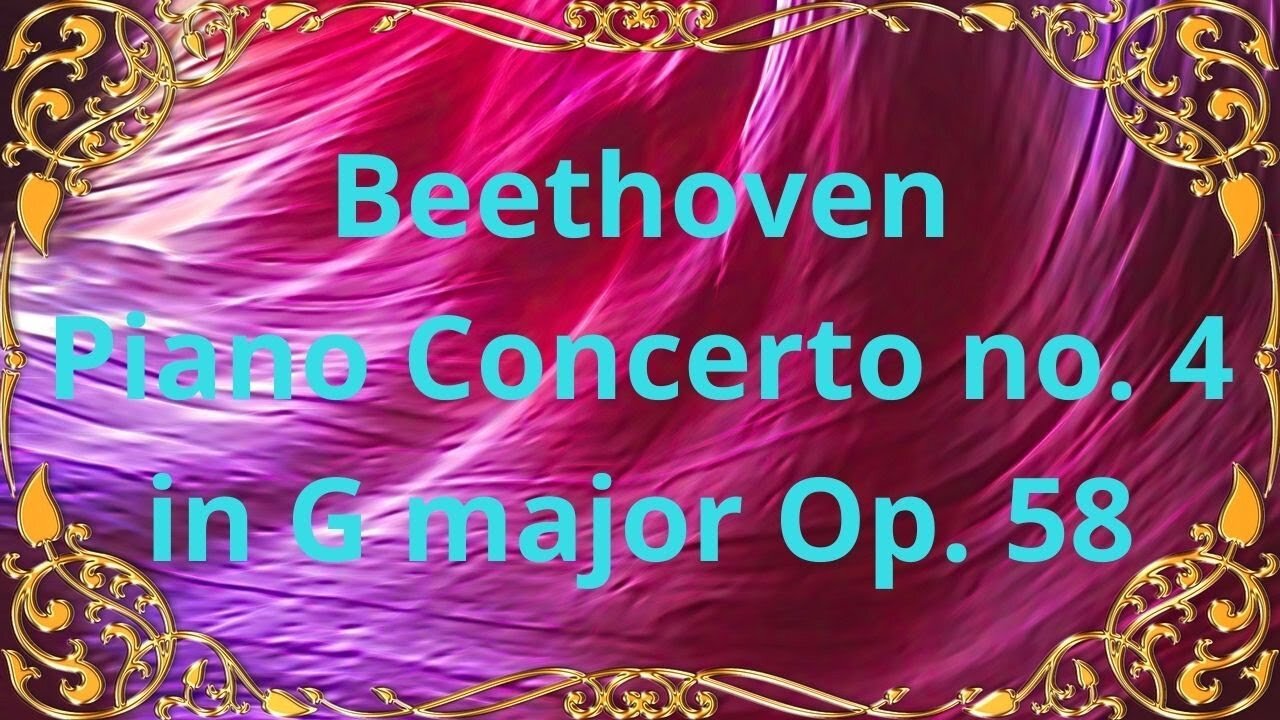Premium Only Content

Beethoven Piano Concerto №4 in G major, Op. 58
#Beethoven #Piano_Concerto#classical_music Ludwig van Beethoven's Piano Concerto No. 4 in G major, Op. 58, is one of the most beautiful and complex works in the classical music repertoire. Composed between 1805 and 1806, the piece showcases Beethoven's exceptional skill as a composer and pianist, and is renowned for its lyricism, elegance, and emotional depth.
The Piano Concerto No. 4 is composed of three movements: Allegro moderato, Andante con moto, and Rondo: Vivace. The first movement opens with a gentle and lyrical piano solo, followed by a lively and cheerful orchestral accompaniment. The second movement, Andante con moto, is a slow and expressive movement, featuring a delicate and emotional piano solo that is set against a rich and lush orchestral background. The final movement, Rondo: Vivace, is a fast and energetic movement, with a playful and lively piano part that is supported by the orchestra.
One of the most notable features of the Piano Concerto No. 4 is its innovative use of musical form. Beethoven deviates from the traditional structure of a piano concerto by integrating the second and third movements, creating a seamless transition between the two. This integration creates a sense of unity and continuity between the movements, giving the work a unique and innovative character.
Another notable aspect of the Piano Concerto No. 4 is the way in which Beethoven showcases his skill as a composer and pianist. The piano part is virtuosic and demanding, with complex runs, trills, and arpeggios that require exceptional technical skill and musicianship. Beethoven himself was a renowned pianist, and his knowledge of the instrument is evident in the way he writes for the piano in this work.
The Piano Concerto No. 4 is also notable for its emotional depth and lyricism. The work is full of contrasts, with moments of great tenderness and beauty followed by moments of intense drama and passion. Beethoven's use of dynamic contrasts, sudden shifts in mood, and unexpected harmonies creates a sense of emotional depth and complexity that keeps the listener engaged and invested in the work.
Overall, the Piano Concerto No. 4 in G major, Op. 58, is a masterpiece of the piano concerto genre. Its innovative structure, virtuosic piano part, and emotional depth have made it a beloved and enduring work in the classical music repertoire. The Piano Concerto No. 4 is a testament to Beethoven's exceptional skill as a composer and pianist, and to his enduring legacy as one of the greatest composers in the history of classical music.
You have the opportunity to support the channel
https://www.donationalerts.com/r/radsiaral
-
 20:26
20:26
Classical music_Music Inspiration
1 month agoJohann Sebastian Bach Orchestral Suite No. 2 in B minor, BWV 1066
842 -
 1:59:43
1:59:43
Side Scrollers Podcast
2 days agoRIP Hulk Hogan + Payment Processor CENSORSHIP Has Officially Begun + More | Side Scrollers
98.4K9 -
 12:14
12:14
Nikko Ortiz
1 day agoMilitary Fails Of The Week
7.57K8 -
 1:16:31
1:16:31
Omar Elattar
9 months agoThe Untold Story: How Vans Became a $3 Billion Dollar Shoe Empire In 75 mins
10.4K5 -
 LIVE
LIVE
Lofi Girl
2 years agoSynthwave Radio 🌌 - beats to chill/game to
372 watching -
 1:56:31
1:56:31
The Pascal Show
17 hours ago $2.35 earnedGHISLAINE FLIPS?! DOJ Receives SECRET LIST of 100 Epstein Associates!”
9.1K2 -
 10:17
10:17
Dr Disrespect
11 days agoIt's Time To Get Serious
180K27 -
 2:15:09
2:15:09
Badlands Media
1 day agoDevolution Power Hour Ep. 375: Obama’s Orders, Ukraine’s Collapse & the Inversion of Justice
298K108 -
 2:32:03
2:32:03
BlackDiamondGunsandGear
14 hours agoAFTER HOURS ARMORY w/ DLD & John from GOA & FLR
29.7K3 -
 1:05:28
1:05:28
Man in America
15 hours agoTREASON? Obama, Hillary, and Soros in the New World Order Agenda EXPOSED w/ Mel K
92.3K83